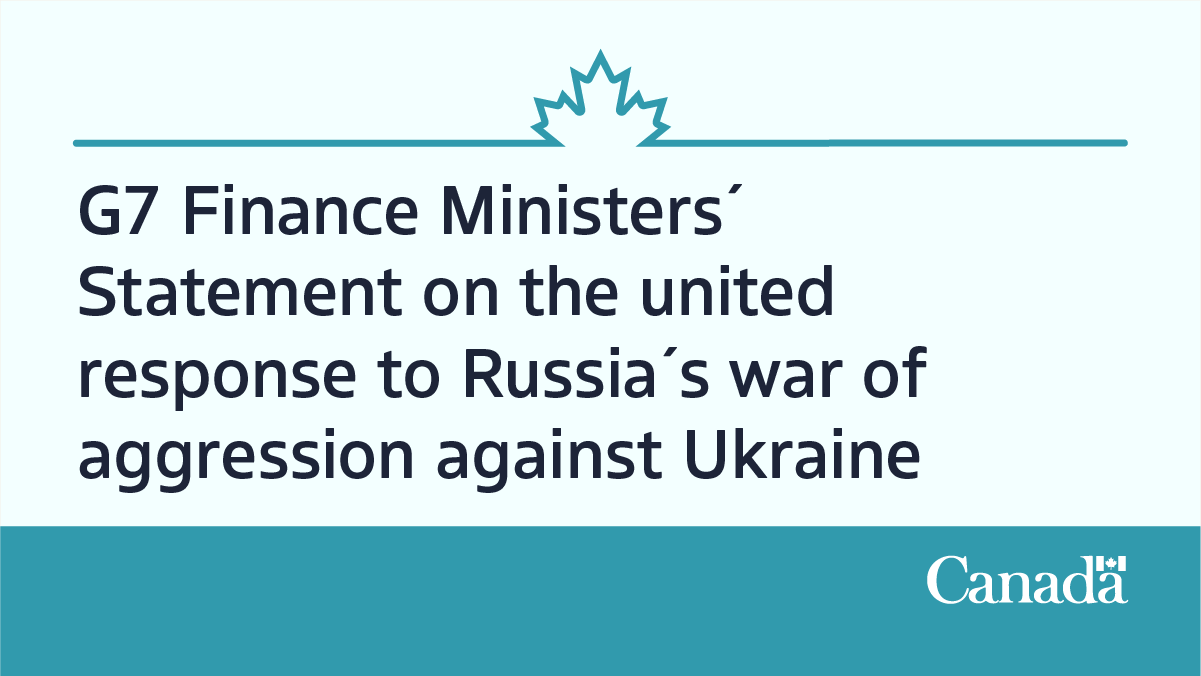No Tariff Mention In G7 Finance Ministers' Concluding Statement

Table of Contents
The G7 Meeting Context and Expectations
The recent G7 Finance Ministers' meeting, held in [Location of Meeting], focused primarily on addressing pressing global economic concerns. Key issues on the agenda included rampant inflation, burgeoning sovereign debt levels in several countries, and concerns regarding slowing global economic growth. Given the ongoing geopolitical instability and the existing trade friction between various nations, it was widely anticipated that trade policies, and specifically tariffs, would feature prominently in the discussions. Pre-meeting speculation suggested a robust debate on the impact of protectionist measures and the need for a coordinated international response. Several finance ministers had made public statements prior to the meeting expressing concerns about rising trade barriers and the potential for further escalation. A unified G7 stance on global economic challenges, including trade, is considered crucial for maintaining stability and promoting international cooperation.
- Pre-meeting speculation: Numerous articles and expert analyses predicted a significant focus on tariff reductions and the harmonization of trade policies.
- Statements by finance ministers: Several ministers issued statements ahead of the meeting highlighting the need for open and fair trade practices.
- Importance of G7 consensus: The G7's collective voice on global economic issues carries significant weight and influence on international trade negotiations and policy decisions.
Analysis of the Concluding Statement's Omission
The official concluding statement released after the meeting notably lacked any mention of tariffs or trade protectionism. This silence is intriguing and opens the door to several interpretations. One possibility is that substantial discussions regarding tariffs did occur behind closed doors, with the decision to omit them from the public statement reflecting a strategic choice to avoid highlighting potential disagreements amongst member nations. Alternatively, it's possible that irreconcilable differences among the G7 members on the issue of tariffs prevented them from reaching a consensus suitable for inclusion in the official statement. This omission could imply that national interests currently outweigh a cohesive G7 approach to trade policy.
- Behind-closed-doors discussions: The absence of public discussion might signify intense and potentially contentious deliberations that failed to produce a shared agreement.
- Disagreements among member nations: Differing national interests and perspectives on trade policy may have made it impossible to formulate a joint statement on tariffs.
- Differing national interests: The decision to avoid the topic may reflect a prioritization of individual national interests over collective action.
- Strategic reasons for exclusion: Omitting tariffs from the public statement could be a strategic move to avoid exacerbating existing trade tensions.
Implications for Global Trade and the Global Economy
The lack of a unified G7 stance on tariffs has significant implications for global trade and the overall health of the global economy. The uncertainty created by this silence could hinder international trade, potentially leading to further escalation of trade disputes between countries. Businesses engaged in international trade face increased uncertainty in planning and investment decisions, while existing global supply chains may become even more vulnerable to disruption. The lack of a coordinated approach to trade issues could also negatively impact global economic growth prospects, further complicating efforts to address inflation and debt challenges.
- Increased uncertainty for businesses: Businesses relying on international trade face increased risk and uncertainty in their operations.
- Escalation of trade disputes: The lack of G7 consensus could embolden countries to pursue protectionist policies unilaterally, leading to further trade conflicts.
- Consequences for global supply chains: Uncertainty and disruptions to trade could exacerbate existing supply chain vulnerabilities.
- Impact on economic growth: Reduced international trade and increased uncertainty can significantly dampen economic growth worldwide.
Reactions and Future Outlook
The omission of tariffs from the G7 statement has prompted diverse reactions. Economists and international business organizations have expressed concerns about the implications for global trade and the potential for further protectionist measures. The World Trade Organization (WTO) and other international bodies may issue statements addressing the G7's silence, emphasizing the need for multilateral cooperation in trade policy. Looking ahead, future G7 meetings may prioritize addressing trade issues more directly. However, the lack of consensus demonstrated at this meeting suggests that reaching a unified stance on tariffs within the G7 will be a challenging task. Bilateral trade negotiations between individual G7 nations are likely to continue even in the absence of a cohesive G7 approach.
- Statements from international organizations: The WTO and other international organizations are likely to express their views on the lack of tariff discussion.
- Predictions for future G7 meetings: Future meetings might dedicate more time and resources to addressing trade-related issues.
- Potential for bilateral trade negotiations: Countries might pursue bilateral trade agreements even without a comprehensive G7 consensus.
Conclusion
The absence of any mention of tariffs in the G7 Finance Ministers' concluding statement is a significant development with potentially far-reaching consequences. The "no tariff mention" underscores the challenges in achieving international cooperation on trade issues amid a complex global landscape. This omission highlights the potential for increased uncertainty, escalating trade disputes, and negative impacts on global economic growth. The lack of a unified front on tariffs from the G7 raises concerns about the future direction of global trade policy and underscores the need for continued vigilance and diplomatic efforts to promote open and fair trade practices. Stay updated on the implications of the lack of tariff discussion in future G7 statements and continue to monitor the evolving situation regarding tariffs and the G7's role in global trade. For further insights, refer to the latest news and analytical reports from reputable sources such as [Link to relevant news source 1] and [Link to relevant news source 2].

Featured Posts
-
 Gauff Advances To Italian Open Final After Three Set Victory Over Zheng
May 26, 2025
Gauff Advances To Italian Open Final After Three Set Victory Over Zheng
May 26, 2025 -
 Paris Roubaix Bottle Throwing Spectator Surrenders To Police
May 26, 2025
Paris Roubaix Bottle Throwing Spectator Surrenders To Police
May 26, 2025 -
 10 Simple Tips For Better Tv And Streaming On Mondays
May 26, 2025
10 Simple Tips For Better Tv And Streaming On Mondays
May 26, 2025 -
 Pourquoi Rtbf Et Rtl Belgium Luttent Contre L Iptv Illegale
May 26, 2025
Pourquoi Rtbf Et Rtl Belgium Luttent Contre L Iptv Illegale
May 26, 2025 -
 Man Confesses To Throwing Bottle At Van Der Poel During Paris Roubaix Race
May 26, 2025
Man Confesses To Throwing Bottle At Van Der Poel During Paris Roubaix Race
May 26, 2025
